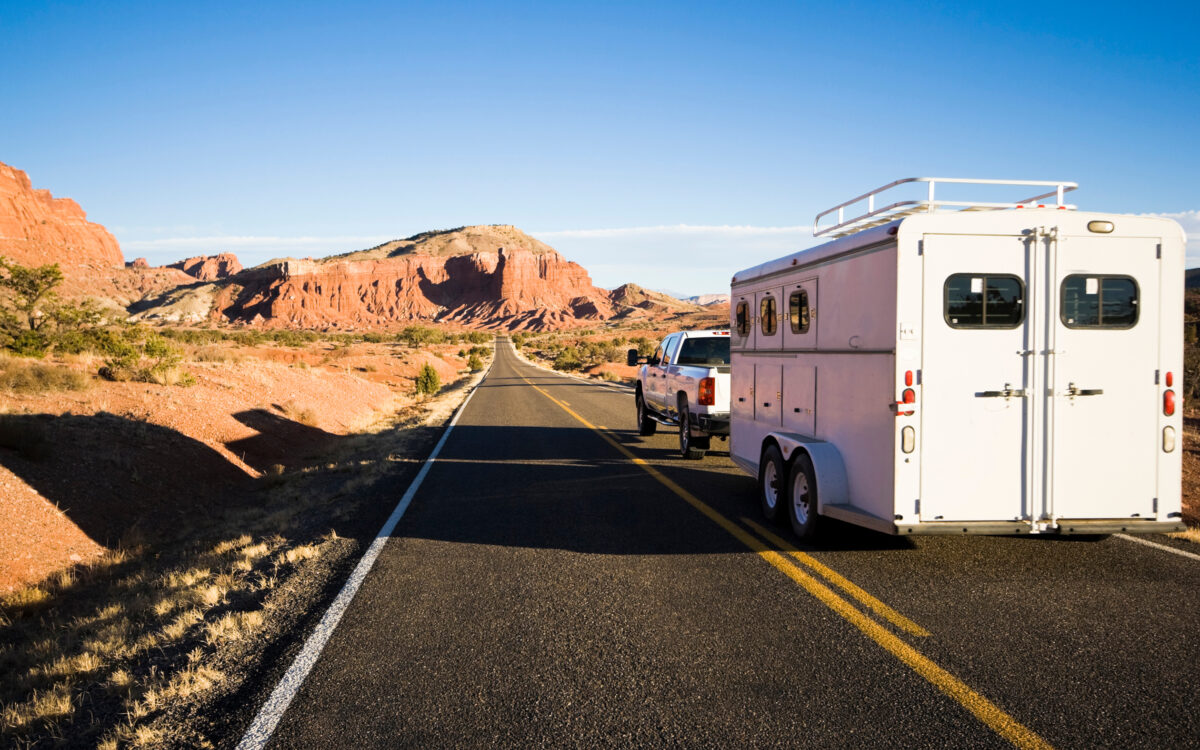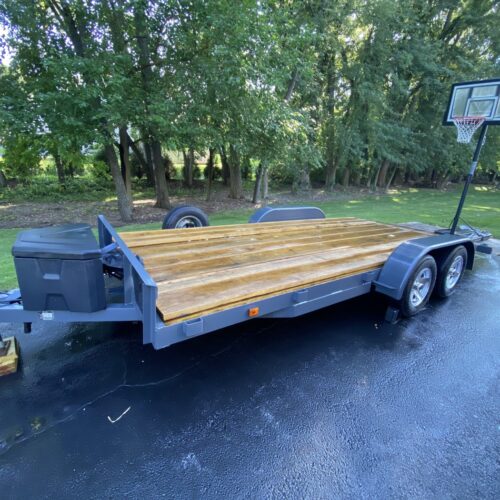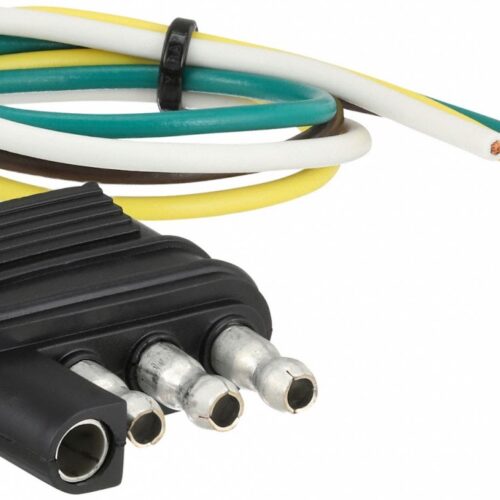Top 3 Essential Concepts for Towing a Trailer Safely and Effectively
Towlos is committed to providing towing suggestions and best practices to help everyone towing trailers to be safer on the road. From my background in the over the road trucking industry, I’ve acquired a lot of knowledge specific to safe towing practices, and I plan to share those with you here on the Towlos blog!
Towing a trailer is a blend of excitement and responsibility. As you navigate this journey, especially as a beginner, there are vital nuggets of wisdom to grasp. With Towlos at your side, you’re set to explore this dynamic world, ensuring every trip is both safe and memorable.
Whether it’s a weekend camping getaway or a cross-town move, understanding the intricacies of towing is crucial. However, it’s more than just attaching a trailer and taking off. As a rookie, there are some crucial bits of know-how you’ll need to get your head around to make sure you’re towing your trailer in a safe and responsible way.
Understanding Towing Capacity
Understanding your vehicle’s towing capacity is crucial for anyone planning to haul a trailer. The towing capacity is the maximum amount of weight your vehicle can pull as determined by the vehicle manufacturer during ideal conditions. It’s also key for ensuring your vehicle can control and stop the trailer safely.
Towing capacity depends on many factors, such as the vehicle’s engine size, brakes, transmission, and frame strength. This is why different types of vehicles have varied towing capacities.
How can you find the towing capacity for your vehicle? Some manufacturers have started including this information on a sticker on your truck. This article is a great resource for helping you understand your vehicle’s towing capacity. Here’s an example of towing capacity from a Chevy truck:
GVWR Plate located on the drivers door sill of most trucks and SUV’s.
Compact Pickup Trucks: These are smaller trucks like the Toyota Tacoma or the Chevrolet Colorado. Typically, compact pickup trucks can tow between 3,500 to 7,500 pounds. This makes them a good choice for towing small boats, trailers, or lightweight campers.
Full-Size Pickup Trucks: Larger trucks like the Ford F-150 or Chevrolet Silverado 1500 have a higher towing capacity. They can typically handle between 7,000 to 12,500 pounds, making them suitable for towing larger campers, boats, or horse trailers.
Heavy-Duty Pickup Trucks: The big boys in the pickup truck category, such as the Ford F-350 or Ram 3500, can tow impressive weights. These heavy-duty trucks have a towing capacity that can range from 13,000 up to 35,000 pounds or more, allowing them to tow large trailers, fifth-wheel campers, or double car haulers.
Key Point: A specified towing capacity includes the weight of the trailer and its load. For example, if your vehicle has a towing capacity of 7,000 pounds, and your trailer weighs 3,000 pounds, you can only load 4,000 pounds onto the trailer. Remember, the given towing capacity only accounts for the driver being in the car. So, if you’re planning a road trip with friends, loading up luggage, or hauling some equipment, make sure you factor that extra weight in. This will ensure that you’re still within your vehicle’s towing limits.
Getting the Right Hitch
For those who are new to towing, the world of trailer hitches can seem like an alphabet soup of terms and ratings. But fret not, we’re here to break down these concepts into bite-sized, digestible pieces to help you get on the road with confidence. Understanding your trailer hitch’s rating and capacity is crucial to ensure a safe and efficient towing experience.
Receiver hitches are incredibly versatile and are the most commonly used type of hitch for towing. There are several types to choose from, depending on your towing needs.
Class I and II Hitches: Class I and II are lightweight hitches typically found on cars and smaller SUVs. Class I hitches can handle up to 2,000 pounds, perfect for small trailers or bike racks. Class II hitches can handle up to 3,500 pounds, making them suitable for slightly larger trailers or small boats.
Class III Hitches: These are heavier-duty hitches often found on larger SUVs and pickup trucks. With a towing capacity of up to 8,000 pounds, they’re perfect for larger trailers, boats, or even small campers.
Class IV and V Hitches: IV and V hitches are heavy-duty hitches typically found on full-size pickup trucks and SUVs. Class IV hitches can handle up to 10,000 pounds, while Class V hitches can handle a whopping 20,000 pounds. They’re the go-to choice for towing large campers, boats, or horse trailers.
All trailers also need to connect to your truck or SUV for power to operate lights and trailer brakes. Learn more about trailer connectors from this post we recently made on the Towlos Blog!
Class IV trailer hitch.
- Mastering Trailer Balance and Weight Distribution
Ever tried to dance with someone twice your size? If you have, you’ll know that the secret isn’t just in the steps, but in the balance and rhythm. Similarly, when towing a trailer, it’s not just about hooking it up and driving off. It’s an art of balance—literally! Ensuring that your trailer is properly balanced and the weight is evenly distributed is the key to a smooth and safe journey. In this section, we’ll take you by the hand and guide you through the steps to make sure you and your Towlos trailer glide seamlessly, every time you hit the road.
Understand Tongue Weight: The Magic Number in Towing
Tongue weight is the amount of the trailer’s weight that presses down on the towing hitch. Typically, the ideal tongue weight should be between 10% and 15% of the total loaded trailer weight. Let’s say you’re hauling a classic car that, together with the trailer, weighs 5,000 pounds. Your tongue weight should ideally fall between 500 and 750 pounds. Too light or too heavy, and you might find the trailer swaying dangerously or your vehicle’s rear sagging, respectively. This short YouTube video clearly displays how tongue weight will affect the handling of your vehicle and trailer when properly, and improperly loaded.
Distribute Weight Evenly: The Key to Stability
When loading your trailer, especially with something as valuable as a car, balance is crucial. Imagine placing your car off-center on the trailer. As you drive, you’ll notice that the trailer pulls or leans towards the heavier side, increasing wear on the tires and risk of an accident. Always ensure the car is centered on the trailer, and if you’re hauling additional equipment, spread it out to maintain equilibrium. Proper distribution isn’t just side-to-side but also front-to-back. You don’t want all the weight pressing down on the hitch or all the way at the back causing the trailer to fishtail.
Towing isn’t just about transporting cargo; it’s a journey that combines the excitement of exploration with the diligence of safety. As you step into the world of towing, it’s essential to be equipped with the right knowledge, ensuring every trip is as seamless as it is thrilling. With Towlos, you’re not just renting a trailer—you’re joining a community committed to safety, adventure, and the open road. Remember, each journey is an opportunity to learn, grow, and create memorable experiences. With each mile you traverse, let Towlos guide you in making every adventure harmonious and unforgettable. Safe travels and let’s get Towing!
Towlos.com is an online trailer sharing marketplace where you can rent trailers directly from their owners. Towlos is committed to offering great trailering advice and content. Check out Towlos.com and create an account to start renting trailers today!




